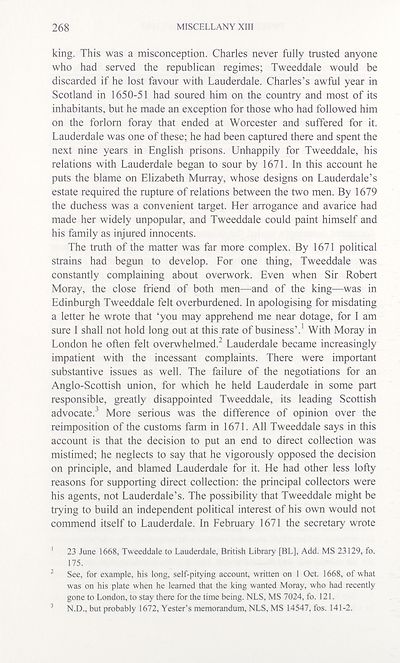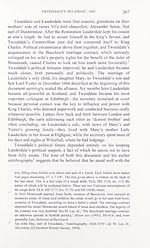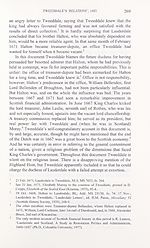Series 5 > Miscellany [of the Scottish History Society] XIII
(283) Page 268
Download files
Complete book:
Individual page:
Thumbnail gallery: Grid view | List view

268
MISCELLANY XIII
king. This was a misconception. Charles never fully trusted anyone
who had served the republican regimes; Tweeddale would be
discarded if he lost favour with Lauderdale. Charles’s awful year in
Scotland in 1650-51 had soured him on the country and most of its
inhabitants, but he made an exception for those who had followed him
on the forlorn foray that ended at Worcester and suffered for it.
Lauderdale was one of these; he had been captured there and spent the
next nine years in English prisons. Unhappily for Tweeddale, his
relations with Lauderdale began to sour by 1671. In this account he
puts the blame on Elizabeth Murray, whose designs on Lauderdale’s
estate required the rupture of relations between the two men. By 1679
the duchess was a convenient target. Her arrogance and avarice had
made her widely unpopular, and Tweeddale could paint himself and
his family as injured innocents.
The truth of the matter was far more complex. By 1671 political
strains had begun to develop. For one thing, Tweeddale was
constantly complaining about overwork. Even when Sir Robert
Moray, the close friend of both men—and of the king—was in
Edinburgh Tweeddale felt overburdened. In apologising for misdating
a letter he wrote that ‘you may apprehend me near dotage, for I am
sure I shall not hold long out at this rate of business’.1 With Moray in
London he often felt overwhelmed.2 Lauderdale became increasingly
impatient with the incessant complaints. There were important
substantive issues as well. The failure of the negotiations for an
Anglo-Scottish union, for which he held Lauderdale in some part
responsible, greatly disappointed Tweeddale, its leading Scottish
advocate.3 More serious was the difference of opinion over the
reimposition of the customs farm in 1671. All Tweeddale says in this
account is that the decision to put an end to direct collection was
mistimed; he neglects to say that he vigorously opposed the decision
on principle, and blamed Lauderdale for it. He had other less lofty
reasons for supporting direct collection: the principal collectors were
his agents, not Lauderdale’s. The possibility that Tweeddale might be
trying to build an independent political interest of his own would not
commend itself to Lauderdale. In February 1671 the secretary wrote
1 23 June 1668, Tweeddale to Lauderdale, British Library [BL], Add. MS 23129, fo.
175.
2 See, for example, his long, self-pitying account, written on 1 Oct. 1668, of what
was on his plate when he learned that the king wanted Moray, who had recently
gone to London, to stay there for the time being. NLS, MS 7024, fo. 121.
3 N.D., but probably 1672, Yester’s memorandum, NLS, MS 14547, fos. 141-2.
MISCELLANY XIII
king. This was a misconception. Charles never fully trusted anyone
who had served the republican regimes; Tweeddale would be
discarded if he lost favour with Lauderdale. Charles’s awful year in
Scotland in 1650-51 had soured him on the country and most of its
inhabitants, but he made an exception for those who had followed him
on the forlorn foray that ended at Worcester and suffered for it.
Lauderdale was one of these; he had been captured there and spent the
next nine years in English prisons. Unhappily for Tweeddale, his
relations with Lauderdale began to sour by 1671. In this account he
puts the blame on Elizabeth Murray, whose designs on Lauderdale’s
estate required the rupture of relations between the two men. By 1679
the duchess was a convenient target. Her arrogance and avarice had
made her widely unpopular, and Tweeddale could paint himself and
his family as injured innocents.
The truth of the matter was far more complex. By 1671 political
strains had begun to develop. For one thing, Tweeddale was
constantly complaining about overwork. Even when Sir Robert
Moray, the close friend of both men—and of the king—was in
Edinburgh Tweeddale felt overburdened. In apologising for misdating
a letter he wrote that ‘you may apprehend me near dotage, for I am
sure I shall not hold long out at this rate of business’.1 With Moray in
London he often felt overwhelmed.2 Lauderdale became increasingly
impatient with the incessant complaints. There were important
substantive issues as well. The failure of the negotiations for an
Anglo-Scottish union, for which he held Lauderdale in some part
responsible, greatly disappointed Tweeddale, its leading Scottish
advocate.3 More serious was the difference of opinion over the
reimposition of the customs farm in 1671. All Tweeddale says in this
account is that the decision to put an end to direct collection was
mistimed; he neglects to say that he vigorously opposed the decision
on principle, and blamed Lauderdale for it. He had other less lofty
reasons for supporting direct collection: the principal collectors were
his agents, not Lauderdale’s. The possibility that Tweeddale might be
trying to build an independent political interest of his own would not
commend itself to Lauderdale. In February 1671 the secretary wrote
1 23 June 1668, Tweeddale to Lauderdale, British Library [BL], Add. MS 23129, fo.
175.
2 See, for example, his long, self-pitying account, written on 1 Oct. 1668, of what
was on his plate when he learned that the king wanted Moray, who had recently
gone to London, to stay there for the time being. NLS, MS 7024, fo. 121.
3 N.D., but probably 1672, Yester’s memorandum, NLS, MS 14547, fos. 141-2.
Set display mode to:
![]() Universal Viewer |
Universal Viewer | ![]() Mirador |
Large image | Transcription
Mirador |
Large image | Transcription
Images and transcriptions on this page, including medium image downloads, may be used under the Creative Commons Attribution 4.0 International Licence unless otherwise stated. ![]()
| Scottish History Society volumes > Series 5 > Miscellany [of the Scottish History Society] XIII > (283) Page 268 |
|---|
| Permanent URL | https://digital.nls.uk/127316925 |
|---|
| Description | Over 180 volumes, published by the Scottish History Society, containing original sources on Scotland's history and people. With a wide range of subjects, the books collectively cover all periods from the 12th to 20th centuries, and reflect changing trends in Scottish history. Sources are accompanied by scholarly interpretation, references and bibliographies. Volumes are usually published annually, and more digitised volumes will be added as they become available. |
|---|


